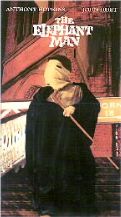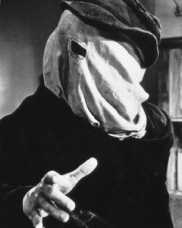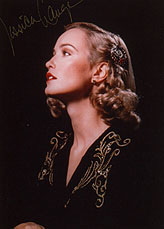Who is the blogger?

Catherine Savard
The Elephant Man (1980) and Frances (1982)
The Beauty in the Beast and the Beast in the Beauty
Frances Farmer was a sensation. Beautiful and outspoken, the movie actress' troubled personal life and turbulent relationships are depicted in a film that is as controversial as the original media personality. Also based on a true story, the horror of John Merrick's private life as "The Elephant Man" makes for an interesting contrast.
Well. “Feel-good” films for my wedding anniversary viewing pleasure they were not. Nor did I expect them to be. I expected these films to be upsetting and insightful and, on both those accounts, they did deliver.
My husband did manage to tough it out watching some of both “The Elephant Man” (1980) and “Frances” (1982) on TVO’s Saturday Night at the Movies. I think he would rather have watched an action flick with Bruce Willis or something of that ilk. Not that that would necessarily have helped much in the “romantic mood enhancer” department.
 The “Elephant Man” (1980) with Anthony Hopkins as Dr. FrederickTreves and John Hurt playing John Merrick set in late 19th century London , is the story of a grotesquely deformed young man who has been badly used and abused. The Hopkins character finds this “creature” and brings him to the London hospital where he proceeds to put him on display for the benefit of his medical colleagues in a scene purposefully reminiscent of the carnival display that the Elephant Man has left behind.
The “Elephant Man” (1980) with Anthony Hopkins as Dr. FrederickTreves and John Hurt playing John Merrick set in late 19th century London , is the story of a grotesquely deformed young man who has been badly used and abused. The Hopkins character finds this “creature” and brings him to the London hospital where he proceeds to put him on display for the benefit of his medical colleagues in a scene purposefully reminiscent of the carnival display that the Elephant Man has left behind.
As the film’s action unfolds, Dr. Treves finds himself called upon to re-examine his own moral conscience, his understanding of humanity, and his motivations. Although it seems he is at first resistant to this process, Treves eventually comes to see that he is has been lacking on all three accounts. He changes his ways. He changes his attitudes. His life and the lives of others are enriched by encountering the noble soul that is John Merrick, the “Elephant Man”.
 “ Frances ” is a film account of the life and times of 1940s movie actress, Frances Farmer. The film begins with the dreamy young 16 year old Frances making her first real stage appearance through reworking the meditations of her personal diary into a high school essay called “God is Dead”. At the delivery of her paper during a public awards ceremony, a prominent woman of the community stands up and says to Frances , “You will be damned straight to hell for saying that!” The crowd recoils in horror both at Frances ’ words and at the “scene” itself as Frances mother, played by Kim Stanley, applauds her daughter’s performance rather loudly.
“ Frances ” is a film account of the life and times of 1940s movie actress, Frances Farmer. The film begins with the dreamy young 16 year old Frances making her first real stage appearance through reworking the meditations of her personal diary into a high school essay called “God is Dead”. At the delivery of her paper during a public awards ceremony, a prominent woman of the community stands up and says to Frances , “You will be damned straight to hell for saying that!” The crowd recoils in horror both at Frances ’ words and at the “scene” itself as Frances mother, played by Kim Stanley, applauds her daughter’s performance rather loudly.
Perhaps Frances does not go straight to hell as the film continues: she makes a few stops along the way. Frances becomes involved in leftist political action, follows her acting career to Russia , New York and then to Hollywood where she encounters disappointment and frustration through being used and abused by the Hollywood studio system. Frances is depicted as an outspoken, temperamental actress with an addictive streak. In this sympathetic treatment of her story, she is definitely not portrayed as mentally ill. She is betrayed by her marriage, by her leftist playright lover, by Hollywood , by her own addictions, by the medical system, and ultimately by her mother who has her committed to a mental institution. Frances is betrayed by the world but a central idea seems to be that she remains “true to herself”.
Hollow comfort. Yes, there is that long-time lover, Harry York (Sam Shepard), who drifts in and out of her life. Whenever things seem to be going particularly poorly for Frances , Harry gets “the call”. Somehow though Harry does not seem to be quite up to the job of supplying real comfort and help for the troubled Frances . At one point Frances is reaching out to Harry, looking for some kind of affirmation of her person and of Harry’s feeling towards her. Her lover remains silent.
 The hellish horrors of the attempts to “cure” Frances of her problems, whatever they are, at the mental institution proceed from bad to worse. They culminate in a transorbital prefrontal lobotomy after which Frances is supposedly “cured”. At the end of the film Frances is depicted as a shell of her former self; dull, lifeless, hopelessly “normal”, robbed of her true self and her emotional capacities. She lives on for many years after the termination of the action of the film in mundane isolation.
The hellish horrors of the attempts to “cure” Frances of her problems, whatever they are, at the mental institution proceed from bad to worse. They culminate in a transorbital prefrontal lobotomy after which Frances is supposedly “cured”. At the end of the film Frances is depicted as a shell of her former self; dull, lifeless, hopelessly “normal”, robbed of her true self and her emotional capacities. She lives on for many years after the termination of the action of the film in mundane isolation.
The film does bring up some very interesting moral questions about mental illness and its treatment, about society’s inability to accept someone who is an outspoken critic, about personal choice and the pursuit of liberty, happiness and fulfillment in the modern era.
Both films are fictionalized accounts of the lives of real people. Sorting out the fact from the fiction of the film is an endless if not an impossible task. John Merrick really did exist. He really was an intelligent, sensitive man trapped in a grotesquely deformed body. He was put on display both in carnivals and for the benefit of “science”. Frances Farmer really was an intelligent, outspoken woman with some pronounced addiction problems. She doubtless did suffer through the indignities of being incarcerated in a mental institution in the first half of the 20th century although it is debatable which exact treatments she underwent. Both individuals suffered great injustices. Both were figures of tragedy.
But why were these people so different? Why do I feel so different at the end of each film? At the end of John Merrick’s life I feel a profound sadness, yet at the same time I am uplifted and ennobled for having known him better through his story depicted on film. At the end of Frances Farmer’s life I feel sick, sad and empty. Although I can say that I have been enlightened as to the depths of human depravity by her story, and I am moved, I cannot say that I am somehow “enriched” by encountering this life on film. I am meant to be angry, I suppose. I do not find this particular emotion in this particular case to go in a very positive direction.
During the interviews, I believe it is one of the screenwriters who speculates as to how it could be that John Merrick could possibly have turned out to be a decent human being in view of his abysmal treatment by society in general and by some individuals in particular. The screenwriter says that one must not underemphasize the importance of the fact that John Merrick did have the benefit of a mother’s tender care during the first three formative years of his life. This marked him for life in a good way, he speculates, no matter what happened to Merrick in later life.
 John Merrick also had access to books. In the movie, Merrick states that his favourite books to read are the Bible and the Anglican Common Book of Prayer. He gives an unexpected and moving recitation of the 23rd psalm at a pivotal point in the film, proving not only his intelligence and love of poetry, but also, I believe, demonstrating his profound love and confidence in His Maker. The screenwriter said that it was the dearest wish of the historical John Merrick to have a Christian burial, something which did not happen due to Treve’s relentless pursuit of scientific knowledge. During the moving death scene, accompanied by Samuel Barber’s wonderful “Adagio for Strings”, the camera pans across to the paper cathedral so lovingly constructed by Merrick during his life and ends by focusing on the cross on the top of the cathedral spire. The open window and fluttering lace behind the cathedral cross imply that a soul has flown up to heaven to rejoin its Maker along with shadowy images of the Mother figure. In a peaceful and better beyond, the mysterious Mother figure says something to the effect that “Nothing will really die.”
John Merrick also had access to books. In the movie, Merrick states that his favourite books to read are the Bible and the Anglican Common Book of Prayer. He gives an unexpected and moving recitation of the 23rd psalm at a pivotal point in the film, proving not only his intelligence and love of poetry, but also, I believe, demonstrating his profound love and confidence in His Maker. The screenwriter said that it was the dearest wish of the historical John Merrick to have a Christian burial, something which did not happen due to Treve’s relentless pursuit of scientific knowledge. During the moving death scene, accompanied by Samuel Barber’s wonderful “Adagio for Strings”, the camera pans across to the paper cathedral so lovingly constructed by Merrick during his life and ends by focusing on the cross on the top of the cathedral spire. The open window and fluttering lace behind the cathedral cross imply that a soul has flown up to heaven to rejoin its Maker along with shadowy images of the Mother figure. In a peaceful and better beyond, the mysterious Mother figure says something to the effect that “Nothing will really die.”
What a different vision of life and reality when compared with “ Frances ”. For Frances , God is dead, a useless product of the human imagination, to be disposed of at the time one’s own choosing. It seems that Frances disposed of God pretty early in her career. Interestingly, it seems that along with God’s untimely demise in Frances view of life, there were also a few other things that got chucked along the way such as genuine compassion, mercy, redemption, forgiveness, hope, inalienable human dignity, and ultimately an unshakable grasp of what it means to be fully human.
 At one point in the film Clifford Odets exhorts Frances to “really look” at a poor girl pathetically begging for money from theatre-goers after a performance. The playwright’s point is that Frances cannot hope to be a great actress and convey to an audience the reality of a beggar’s plight until she internalizes the emotion of the moment. True enough. Frances goes on to be a better actress because of Clifford Odet’s remarks. But for Frances , that is all that it is; the challenge of summoning up a semblance of the emotion, in other words play-acting. You don’t get the picture that she as a person really learns to deal with true compassion with the human condition of this other person. Frances is forever play-acting to get ahead with her own happiness in her own life. Even her fits of rage at social injustice, while I would not go so far to say that they are a “put-on”, seem rather superficial, abstract, disconnected with a real life to life compassion à la Mother Theresa-save-a-street-child vision of things. It seems cruel and terribly politically incorrect for me to suggest it, but I am afraid that Frances was a hollow woman long before the infamous (and let me underline unjust) lobotomy.
At one point in the film Clifford Odets exhorts Frances to “really look” at a poor girl pathetically begging for money from theatre-goers after a performance. The playwright’s point is that Frances cannot hope to be a great actress and convey to an audience the reality of a beggar’s plight until she internalizes the emotion of the moment. True enough. Frances goes on to be a better actress because of Clifford Odet’s remarks. But for Frances , that is all that it is; the challenge of summoning up a semblance of the emotion, in other words play-acting. You don’t get the picture that she as a person really learns to deal with true compassion with the human condition of this other person. Frances is forever play-acting to get ahead with her own happiness in her own life. Even her fits of rage at social injustice, while I would not go so far to say that they are a “put-on”, seem rather superficial, abstract, disconnected with a real life to life compassion à la Mother Theresa-save-a-street-child vision of things. It seems cruel and terribly politically incorrect for me to suggest it, but I am afraid that Frances was a hollow woman long before the infamous (and let me underline unjust) lobotomy.
And let’s not forget the role of Frances ’ mother. Lillian is portrayed as a woman who appears at first to be loving and supportive of her daughter, but in the end she is shown to be anything but. It is but a role. When Frances fails to live up to her mother’s expectations and fulfill her vicarious dreams of glamour and greatness, Lillian is revealed to be just as self-serving and hollow as her daughter. Lillian accuses Frances of being an ungrateful child who throws opportunity away with both hands. In fact, Frances is only a reflection of her mother who in her own right lives a selfish ungrateful existence devoted to her own comfort while throwing away the treasures of a precious and talented soul entrusted to her care. What a contrast with John Merrick, a man who overflows with genuine gratitude at the gift of a small box of toiletries and who, despite his harsh history, lives in complete happiness at the end of his days because of some small kindness shown to him.
Suggested Reading:
- A beautiful life: an international model battles addictions
- Is God really dead?: evidence from beyond the stars
- Strange but true: why bother with reading the Bible?
- Personal ambition: who's in the driver's seat on your life's quest?



